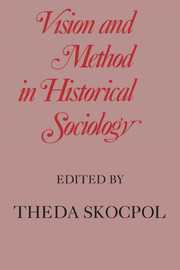Book contents
- Frontmatter
- Contents
- Preface
- 1 Sociology's Historical Imagination
- 2 The Social and Historical Landscape of Marc Bloch
- 3 Beyond the Economistic Fallacy: The Holistic Social Science of Karl Polanyi
- 4 Configurations in History: The Historical Sociology of S. N. Eisenstadt
- 5 Theoretical Generalization and Historical Particularity in the Comparative Sociology of Reinhard Bendix
- 6 Destined Pathways: The Historical Sociology of Perry Anderson
- 7 E. P. Thompson: Understanding the Process of History
- 8 Charles Tilly's Collective Action
- 9 The World System of Immanuel Wallerstein: Sociology and Politics as History
- 10 Discovering Facts and Values: The Historical Sociology of Barrington Moore
- 11 Emerging Agendas and Recurrent Strategies in Historical Sociology
- An Annotated Bibliography on Methods of Comparative and Historical Sociology
- Notes on the Contributors
11 - Emerging Agendas and Recurrent Strategies in Historical Sociology
Published online by Cambridge University Press: 05 June 2012
- Frontmatter
- Contents
- Preface
- 1 Sociology's Historical Imagination
- 2 The Social and Historical Landscape of Marc Bloch
- 3 Beyond the Economistic Fallacy: The Holistic Social Science of Karl Polanyi
- 4 Configurations in History: The Historical Sociology of S. N. Eisenstadt
- 5 Theoretical Generalization and Historical Particularity in the Comparative Sociology of Reinhard Bendix
- 6 Destined Pathways: The Historical Sociology of Perry Anderson
- 7 E. P. Thompson: Understanding the Process of History
- 8 Charles Tilly's Collective Action
- 9 The World System of Immanuel Wallerstein: Sociology and Politics as History
- 10 Discovering Facts and Values: The Historical Sociology of Barrington Moore
- 11 Emerging Agendas and Recurrent Strategies in Historical Sociology
- An Annotated Bibliography on Methods of Comparative and Historical Sociology
- Notes on the Contributors
Summary
Master agendas for historical sociology were first set back when Tocqueville, Marx, Durkheim, and Weber asked important questions and offered such fruitful, if varying, answers about the social origins and effects of the European industrial and democratic revolutions. During the twentieth century, the major scholars discussed in the essays collected here have been at the forefront of those carrying forward the traditions of historical sociology launched by the founders. At moments, to be sure, these men may have seemed rather isolated bearers of modes of scholarship that most sociologists considered part of the honored past rather than the vital present and future of the discipline. By now, however, it is clear enough that the stream of historical sociology has deepened into a river and spread out into eddies running through all parts of the sociological enterprise.
Until the 1970s, “historical sociology” was not a phrase one often, if ever, heard in conversations among sociologists in the United States. Of course, major works of comparative history by the likes of Bendix, Eisenstadt, and Moore were widely known and respected. But these works were thought to be peculiar accomplishments. Only unusually cosmopolitan older men, operating in relative isolation from the mainstreams of empirical research in the discipline, were considered capable of producing such major historical works, while ordinary sociologists used quantitative or field-work techniques to study specialized aspects of present-day societies.
- Type
- Chapter
- Information
- Vision and Method in Historical Sociology , pp. 356 - 391Publisher: Cambridge University PressPrint publication year: 1984
- 128
- Cited by

